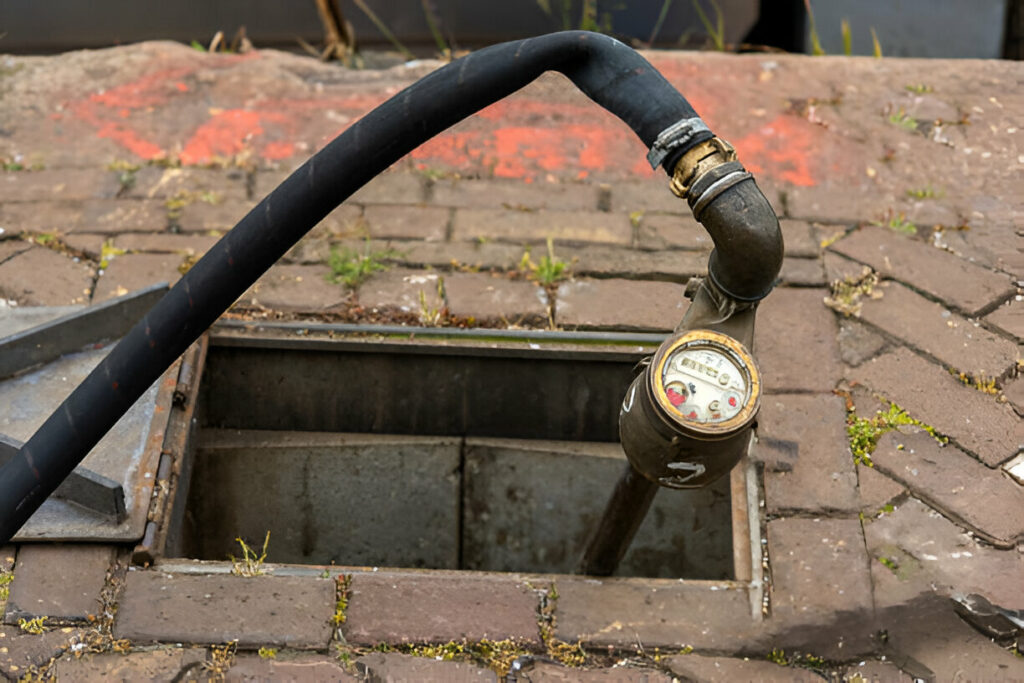Understanding External Drains
Definition and Function
External drains are designed to manage and channel water away from your property. They collect rainwater, surface water, and sometimes wastewater, directing it to the main sewer system or a drainage field.
Types of External Drains
There are two primary types of external drains:
- Surface Water Drains: These collect rainwater and runoff from roofs, driveways, and other surfaces.
- Foul Water Drains: These handle wastewater from household plumbing fixtures like sinks, toilets, and showers.
Signs of a Blocked External Drain
Recognizing the signs of a blocked external drain early can help you address the problem before it becomes severe. Look out for:
- Water pooling around the drain: This is a clear indication that water isn’t draining away as it should.
- Foul odors: Bad smells coming from the drain usually signal a blockage caused by decomposing organic matter.
- Slow drainage or overflow: If water drains slowly or overflows during heavy rain, it’s likely that the drain is blocked.
Common Causes of Blocked External Drains
Understanding what causes blockages can help you prevent them. Here are some common culprits:
Debris and Leaves
Leaves, twigs, and other organic debris can accumulate in external drains, particularly during the autumn months, leading to blockages.
Fat, Oil, and Grease
Pouring fat, oil, and grease down the sink can cause them to solidify and build up in your drain, eventually causing a blockage.
Sediment and Soil
Over time, sediment and soil can build up in your external drain, especially if there’s no filter to catch them.
Foreign Objects
Small objects like toys, stones, or plastic can accidentally end up in the drain and cause blockages.
DIY Methods to Unblock an External Drain
If you’re a DIY enthusiast, here are some methods you can try to unblock your external drain:
Required Tools and Materials
- Drain rods or a drain snake
- Plunger
- Bucket
- Gloves
- Hosepipe
Safety Precautions
Always wear gloves to protect your hands and be cautious when handling tools and chemicals.
Step-by-Step Guide
- Removing Visible Debris: Start by removing any visible debris from the drain cover.
- Using a Plunger: Place the plunger over the drain and pump vigorously to dislodge the blockage.
- Deploying a Drain Snake: Insert the drain snake into the drain and twist it to break up the blockage.
Chemical Solutions for Drain Blockages
If manual methods don’t work, you might need to use a chemical drain cleaner.
Types of Chemical Cleaners
There are various types of chemical cleaners, including acidic, alkaline, and enzymatic cleaners.
How to Use Them Safely and Effectively
Follow the instructions on the product carefully. Generally, you pour the cleaner into the drain, wait for it to break down the blockage, and then flush with water.
Environmental Considerations
Choose biodegradable and environmentally friendly products whenever possible to minimize environmental impact.
Preventing Future Blockages
Preventing blockages is easier and less stressful than dealing with them after they occur. Here are some tips:
Regular Maintenance Routines
Regularly inspect and clean your external drains to prevent blockages from forming.
Installing Drain Covers
Use drain covers to catch leaves, debris, and other objects before they enter the drain.
Proper Waste Disposal Practices
Avoid pouring grease, fat, and other thick substances down your drains.
When to Call a Professional
Sometimes, DIY methods aren’t enough. Here are signs that you need professional help:
Indications of Severe Blockage
- Persistent blockages that DIY methods can’t fix
- Frequent foul smells
- Slow drainage despite your efforts
What to Expect from Professional Services
A professional will use specialized tools and techniques to thoroughly clean your external drain and address any underlying issues.
Cost of Professional Drain Unblocking Services
Typical Price Range
The cost of professional drain unblocking varies but typically ranges from $100 to $300.
Factors Affecting Cost
Factors include the severity of the blockage, the location of the drain, and the method used to clear it.
Tips for Choosing a Reliable Service
Look for reviews and ask for recommendations from friends or family to find a trustworthy service provider.
Eco-Friendly Drain Maintenance
Want to keep your drains clear while being kind to the planet? Try these eco-friendly methods:
Green Cleaning Products
Use biodegradable and non-toxic cleaning products to maintain your drains.
Natural Blockage Prevention Methods
Pour boiling water, vinegar, and baking soda down the drain regularly to prevent build-up.
Impact of Blocked Drains on Property
Blocked drains aren’t just a nuisance; they can cause serious damage:
Potential Structural Damage
Water that can’t drain properly can cause structural damage to your property over time.
Health Risks Associated with Blocked Drains
Stagnant water can attract pests and harbor bacteria, posing health risks to you and your family.
Common Myths About Drain Maintenance
Let’s clear up some common misconceptions about external drains:
Debunking Popular Misconceptions
- “All drains are the same.”
- “You can pour anything down the drain as long as it fits.”
Effective Drain Care Tips
Different types of drains require different care, and not everything should go down the drain.
Seasonal Maintenance Tips
Keeping your drains clear requires different strategies throughout the year:
Preparing Drains for Different Weather Conditions
- Clean drains before and after the rainy season to prevent build-up.
- Ensure drains are free of ice and debris during winter months.
Seasonal Tasks to Prevent Blockages
- Regularly remove leaves and debris in the autumn.
- Flush drains with water regularly during dry months.
Emergency Tips for Blocked Drains
Sometimes, blockages happen at the worst possible time. Here are some emergency tips:
Immediate Actions to Take
- Remove visible debris quickly.
- Use a plunger to try and clear the blockage.
- Pour hot water down the drain to dissolve grease.
Conclusion!!
Blocked external drains can cause significant inconvenience and potential damage if not addressed promptly. By understanding the common causes, signs, and DIY methods for unblocking drains, you can effectively manage minor issues before they escalate. Regular maintenance and proper waste disposal practices are key to preventing blockages. However, for persistent or severe blockages, it’s crucial to seek professional help to ensure the problem is resolved thoroughly.







